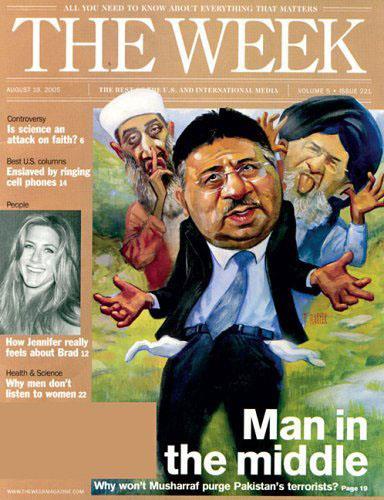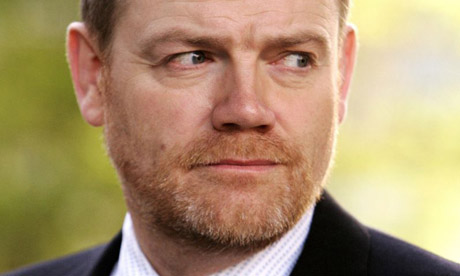Monday 26 January 2009
A RIGHT BIG FUSS
"So we should let innocent people suffer for the sake of being impartial? We should give emergency aid to people who need it, whether they're in Gaza, Israel or anywhere else. It's not saying Gaza were in the right, it's just saying we should help people who are suffering because of the atrocity of war."
"The war in Gaza is disproportionate, and so are its consequences. Do we really want to be the people saying: 'screw those suffering Palestinian children; this is about principle?' Some things are more important than 'editorial impartiality.' I don't agree they'd be being partisan by broadcasting it - they have an opportunity to help save lives! Today's newspaper is tomorrow's fish and chip wrapper - here's a chance for them to do something important."
There was a superb leader in The Independent today which said how if the BBC decided to show this appeal, they could end up showing many more appeals for other charities. It added: "As one of the world's most respected newsgathering and broadcasting organisations, [the BBC] does not need the responsibility of arbitrating which deserving causes should win its endorsement."
So what do I make of all this then? Impartiality is very important - the BBC say it's "at the heart" of who they are. It's not a case of refusing to give aid to people - as the BBC and Sky both aren't condeming it; it's just not appropriate to their output. Yes, we should give aid to those in need, but I feel it's not right that impartial broadcasters should advertise this. My own trade union, the National Union of Journalist, are against the decision, but I don't want our TV news to end up like the biased al Jazeera or Fox News. It's more important to save kids than worry about editorial values, but that is not the purpose of Sky News or the BBC. They're not there to save lives - they're there to provide a public service of impartial news. Long live impartial journalism!
Phew.
Anyway - onto less serious topics... Amy Winehouse has announced she's a Southend United fan. Well I never. Apparently Osama bin Laden has been to see Arsenal in the past, but I'm not sure he would be so welcome if he popped over for the next game at the Emirates. But as for Amy; we'd tried to get her down at Roots Hall, but she said 'no, no, no'!
Monday 19 January 2009
THE WEEK THAT WAS
ABOUT
The Week is a weekly magazine owned by Dennis Publishing and produced by a
 team of around 15 people in a west London office. It collates the many UK and foreign newspapers, magazines and websites into an intelligent batch and is the biggest-selling subscription magazine in the UK (only 3% of sales are from newsagents). The Week’s latest ABC circulation results were over 150,000, which is 75% of The Independent’s figure.
team of around 15 people in a west London office. It collates the many UK and foreign newspapers, magazines and websites into an intelligent batch and is the biggest-selling subscription magazine in the UK (only 3% of sales are from newsagents). The Week’s latest ABC circulation results were over 150,000, which is 75% of The Independent’s figure.It was started 14 years ago in a garage by former Telegraph and Times correspondent Jon Connell, and circulation has grown steadily over this time; increasing for the last 20 consecutive half-year periods. The current editor is Jeremy O’Grady, assisted by his wife, Caroline Law, alongside deputy editors Harry Nicole and Theo Tait. I was primarily working with the researcher, Cal Flyn.
TASKS
Much of my role as a researcher involved sorting and photocopying vast amounts of newspapers for the editorial team to use in their reports. In a weekly Monday meeting, the editorial team comes together to discuss the week’s agenda. During my first week, this meeting decided
 that the subjects to be primarily researched would be Gaza, Guantanamo Bay, the impending recession, Cuba, the Euro, working-class whites and the Tories. In the second week, it was Gaza, the recession and Tories again - but new topics included Prince Harry and the ‘Paki’, social mobility, Russia v Ukraine, Obama, Heathrow, Kevin Pieterson and Heathrow airport. So quite a mixture in there, which represents the diversity of subjects covered by The Week.
that the subjects to be primarily researched would be Gaza, Guantanamo Bay, the impending recession, Cuba, the Euro, working-class whites and the Tories. In the second week, it was Gaza, the recession and Tories again - but new topics included Prince Harry and the ‘Paki’, social mobility, Russia v Ukraine, Obama, Heathrow, Kevin Pieterson and Heathrow airport. So quite a mixture in there, which represents the diversity of subjects covered by The Week.Another part of the researcher’s job is to find things to write about, such as spotting any health & science stories covered in the press, or any travel write-ups which could be useful to the respective sections. Regarding actually writing for the magazine, the researcher does not do too much of this as they are effectively doing the ground work for everyone else. However I did get the chance to write Poll Watch and Good Week during my first week, and Bad Week, Poll Watch and Farewells during my second. I also had a go at a few other sections like It Wasn’t All Bad and Travel, in order to help out the journalists who were actually writing them.
COMMENT
I haven’t worked on a magazine before, so I was really looking forward to getting started on The Week. The pace of the office was far slower to what I’m used to, but I was well aware that those around me were very talented journalists capable of turning thousands of words in newspapers into tight and digestible copy for busy readers. Journalism in The Week is of a ver
 y high quality, and it was easy to tell why once I’d met who I was working with. I learnt a lot during my six days there and it was a very worthwhile experience.
y high quality, and it was easy to tell why once I’d met who I was working with. I learnt a lot during my six days there and it was a very worthwhile experience.Magazine journalism is just not fast-paced enough for me, but I wouldn’t rule out working in the field - it’s just that working on the likes of Sky News, LBC Radio and BBC Sport has made me think every media outlet is all about “now, now, now”! I do work better under pressure, and enjoy getting more written than I did at The Week, but being a researcher means you’re still a major part of the team. But everything written is anonymous, so the whole team carries the can when things go wrong!
Monday 12 January 2009
CHANNEL 4.5?
 channels are so far apart in content that a merger would probably destroy both of their viewer bases, plunging them into even more trouble during the anticipated recession. Channel 4 has a history of providing cutting-edge documentaries, religious programmes and music - whereas Five is more concerned with popular American imports. These two do not go hand in hand! Five News is an entirely different product to Channel 4 News - Five prides itself on being different to the mainstream and covering stories that the BBC and ITV won't touch. Channel 4 News is a far more serious programme, headed by the legendary Jon Snow, and they both do their job very well. A television station should stick to what it does best. Since the collapse of Channel 4 Radio, opportunities for plurality on the wireless have dropped sharply - so please don't let that happen to terrestrial television too. Mark Thomson's got a vested interest: Channel 4 and Five are the BBC's competitors, so it's no surprise that he's made these comments. More here: http://www.guardian.co.uk/media/2009/jan/13/channel4-channelfive
channels are so far apart in content that a merger would probably destroy both of their viewer bases, plunging them into even more trouble during the anticipated recession. Channel 4 has a history of providing cutting-edge documentaries, religious programmes and music - whereas Five is more concerned with popular American imports. These two do not go hand in hand! Five News is an entirely different product to Channel 4 News - Five prides itself on being different to the mainstream and covering stories that the BBC and ITV won't touch. Channel 4 News is a far more serious programme, headed by the legendary Jon Snow, and they both do their job very well. A television station should stick to what it does best. Since the collapse of Channel 4 Radio, opportunities for plurality on the wireless have dropped sharply - so please don't let that happen to terrestrial television too. Mark Thomson's got a vested interest: Channel 4 and Five are the BBC's competitors, so it's no surprise that he's made these comments. More here: http://www.guardian.co.uk/media/2009/jan/13/channel4-channelfive  example for you - I work for two companies in London, Premier Christian Radio and Five News (BSkyB). Daily return train travel to Premier (Leigh-on-Sea to St James Park tube) is £17.00 [up 6.3% on 2008], and to BSkyB (Leigh-on-Sea to Syon Lane) is £20.10 [up 5.8%]. That is a lot of money, so could someone please explain whilst other consumer prices are staying frozen or falling, the train companies find pleasure through increasing fares by 6%? I feel ripped-off, especially when the service is often far from satisfying due to late trains and lack of seats during rush hour. But on a more positive note, I was going to watch Leyton Orient v Sheffield United 10 days ago in east London (I follow three United's - Newcastle, Sheffield and Southend; how's that for a mixture!) and the game was abandoned on my way there due to a frozen pitch. So I turned back home, safe in the knowledge I had wasted £8.30 on a train ticket. But the ticket attendant had other ideas and she gave me a full refund! This proves that not everyone involved with trains is a pen-pushing money-grabber. It restored my faith in human beings, as the Daily Mail might put it.
example for you - I work for two companies in London, Premier Christian Radio and Five News (BSkyB). Daily return train travel to Premier (Leigh-on-Sea to St James Park tube) is £17.00 [up 6.3% on 2008], and to BSkyB (Leigh-on-Sea to Syon Lane) is £20.10 [up 5.8%]. That is a lot of money, so could someone please explain whilst other consumer prices are staying frozen or falling, the train companies find pleasure through increasing fares by 6%? I feel ripped-off, especially when the service is often far from satisfying due to late trains and lack of seats during rush hour. But on a more positive note, I was going to watch Leyton Orient v Sheffield United 10 days ago in east London (I follow three United's - Newcastle, Sheffield and Southend; how's that for a mixture!) and the game was abandoned on my way there due to a frozen pitch. So I turned back home, safe in the knowledge I had wasted £8.30 on a train ticket. But the ticket attendant had other ideas and she gave me a full refund! This proves that not everyone involved with trains is a pen-pushing money-grabber. It restored my faith in human beings, as the Daily Mail might put it.21 out of 36 Football League matches were postponed on Saturday due to frozen pitches. In 2009, clubs still can't get their heads round the fact that it is COLD in England and this might happen! The Premier League might be investigating Portsmouth and Fulham over whether they could have made more of an effort to get their games ahead, and I think the same investigation should be done for many Football League clubs. Postponements cause all sorts of trouble for travelling fans, so well done Southend for postponing 24 hours beforehand to stop Crewe fans coming down from the north-west. But when a game is called off so late - like my trip to Leyton Orient recently - it costs money and time for supporters, creating a lot of stress. So this is a message to football clubs across the country: take better precautions to avoid postponements as they cause a lot of hassle (install some pitch heaters etc; they're not that expensive). And if you're going to call it off, don't do so with an hour until kick-off!
Tuesday 6 January 2009
THE RIDDLE OF RIGG
I've just started work experience at The Week magazine and I'm going to be stationed
 there until next Wednesday. If you're not familiar with The Week, it's a Dennis Publishing magazine that goes through all of the newspapers from the previous seven days and picks out the best stories from Britain and abroad, mixing in analysis and commentary from the media. Therefore it's a pretty big research job to source all of the information, and that's what I've been doing over the last few days - in addition to things like fact-checking as well as writing up bits and pieces. It's a unique magazine that has a strong and loyal band of subscribers, but is also growing very fast. The target audience seems to be the upper class, but it also makes people who aren't upper class feel like they're upper class (I feel a Frost Report sketch coming on...) which is always nice. Anyway, I'll let you know next week how I'm getting on, but it's been fun so far!
there until next Wednesday. If you're not familiar with The Week, it's a Dennis Publishing magazine that goes through all of the newspapers from the previous seven days and picks out the best stories from Britain and abroad, mixing in analysis and commentary from the media. Therefore it's a pretty big research job to source all of the information, and that's what I've been doing over the last few days - in addition to things like fact-checking as well as writing up bits and pieces. It's a unique magazine that has a strong and loyal band of subscribers, but is also growing very fast. The target audience seems to be the upper class, but it also makes people who aren't upper class feel like they're upper class (I feel a Frost Report sketch coming on...) which is always nice. Anyway, I'll let you know next week how I'm getting on, but it's been fun so far!My relationship with ITV Sport has gone through a bit of a rollercoaster over the last few days. After they showed 30 seconds of highlights for Chelsea v Southend at the weekend I was absolutely gutted, but then they announced they're going to show the replay live on ITV
 1 next Wednesday! If you hadn't heard, the FA Cup game finished 1-1 on Saturday, which was one of the biggest shocks of the round - and certainly one of the biggest results in Southend's history. But why ITV aired 20 minutes of Forest Green Rovers 3 Derby County 4 in their highlights programme is beyond me. Perhaps it was as bait to ensure the fans of bigger clubs stayed up through the advert breaks until their team was on, but that's no excuse for giving this round's other shock results like Torquay 1 Blackpool 0, Hartlepool 2 Stoke 0 and Man City 0 Nottingham Forest 3 under a minute of coverage. Give The FA Cup back to the BBC!
1 next Wednesday! If you hadn't heard, the FA Cup game finished 1-1 on Saturday, which was one of the biggest shocks of the round - and certainly one of the biggest results in Southend's history. But why ITV aired 20 minutes of Forest Green Rovers 3 Derby County 4 in their highlights programme is beyond me. Perhaps it was as bait to ensure the fans of bigger clubs stayed up through the advert breaks until their team was on, but that's no excuse for giving this round's other shock results like Torquay 1 Blackpool 0, Hartlepool 2 Stoke 0 and Man City 0 Nottingham Forest 3 under a minute of coverage. Give The FA Cup back to the BBC!PICTURE: Football Association
